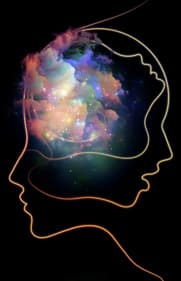What is the Organismic Self?
The term ‘organismic self’ is often used in person-centred counselling, of which Carl Rogers was the founder. Many person-centred practitioners assert that we have three selves:
- our organismic self
- our ideal self
- our self-concept
Tudor and Merry (2006: 129) describe the term ‘organismic self’ as being 'originally coined by Seeman (1983) and taken up by Mearns and Thorne (1988)'. However, counsellor and lecturer Robert Cunliffe contacted us to note an earlier use – in 1982 – by Richard Nelson-Jones.
The organismic self is sometimes also referred to as the ‘real self’, which is a term used in some other modalities too, such as transactional analysis.
Feltham and Dryden (1993:155) describe the real self as ‘that part of one’s identity felt or considered to be authentic … The term implies that there is a quality of authenticity beneath the persona, or habitual self as presented to the world.’

Thus, the organismic self is the true self; it is there when we are born and it naturally strives towards growth, maturity and self-actualisation.
If it is allowed to grow and flourish, it knows what it needs both from its environment and from other people (i.e. our relationships).
So What Can Go Wrong?
Although the organismic self is present at the birth of a baby, ‘the expression of positive regard towards him [sic] by someone significant to him becomes more important to him than his own organismic valuing process, and he begins to seek positive regard from others at the expense of any other experience’ (Merry, 2014: 27).
This process of taking on conditions of worth often continues without the child being aware of it, meaning that we end up as adults who experience incongruence.
How Can Therapy Help?
The organismic self is who we really are inside.
But we are properly aware of it only if we are self-actualising, and operating from an internal locus of evaluation – trusting our own instincts, i.e. using our organismic valuing process (‘internal, reliable, psychophysiological indications of how one feels in relation to events, people and choices’ – Feltham and Dryden 1993: 126).
Person-centred theory claims:
… if an individual only experienced unconditional positive regard [UPR], then no conditions of worth would develop and the needs for positive regard from others and positive self-regard would never come into conflict. The individual would be perfectly psychologically adjusted and would be a fully functioning person – one open to all experiencing who never needed to deny or distort any of it in awareness. (Merry, 2014: 27)
The person-centred therapist offers the client UPR (together with empathy and congruence). This enables the client to begin to become aware of and challenge their conditions of worth, re-contacting their organismic self and increasingly trusting their organismic valuing process:
"As the actualizing tendency moves us towards greater integration between our experiencing and self-structure, we begin to trust our experience more and distort or deny it less. We begin to make our own judgements about ourselves and the world." (Tolan, 2003: 43)
Baker (2012: 71) describes this as follows:
"I think it is conventional person-centred wisdom that as a result of having a therapeutic relationship characterised by what we have come to refer to the six conditions (Rogers, 1957), our belief would be that clients would be able to live more fluidly, more spontaneously, more autonomously, and more in ways informed by their organismic valuing process."
Free Handout Download
What is the Organismic Self

The organismic self is who we really are inside, but we are properly aware of it only if we are self-actualising, and operate from an internal locus of evaluation.
Example
The same behaviour in different clients may or may not suggest they are out of touch with their organismic self; each case is individual.
For example, Haugh (2012: 20–21) describes a client who, faced with bereavement, did not cry, although he was feeling distraught and distressed. She explains:
There are two theoretical possibilities here. First, that although Andrew felt deeply affected by his loss, his lack of tears was … in congruence with his organismic experience. That is, he did not have a condition of worth which told him that boys don’t cry, and his not crying was a psychologically healthy response for him as his organismic valuing did not have tears as an expression. On the other hand, if he did have the condition of worth that boys don’t cry, although his organismic experiencing may have included expression through tears, his self-concept would have denied or distorted this expression to awareness.
Receiving UPR, empathy and congruence within the therapeutic relationship would allow Andrew to work out which of these two possibilities was true, and so grow.
Free Handout Download
What is the Organismic Self
References
Baker (N (2012) ‘Experiential person-centred therapy’ in Sanders P (ed.) The Tribes of the Person-Centred Nation, PCCS Books
Feltham C and Dryden W (1993) Dictionary of Counselling, Whurr Publishers
Haugh S (2012) A Person-Centred Approach to Loss and Bereavement’ in Tolan J and Wilkins P (eds.) Client Issues in Counselling and Psychotherapy, Sage
Merry T (2014) Learning and Being in Person-Centred Counselling, PCCS Books
Rogers C (1957) ‘The Necessary and Sufficient Conditions of Therapeutic Personality Change’, Journal of Consulting Psychology: https://app.shoreline.edu/dchris/psych236/Documents/Rogers.pdf
Tolan J (2003) Skills in Person-Centred Counselling & Psychotherapy, Sage
Tudor K and Merry T (2006) Dictionary of Person-Centred Psychology, PCCS Books